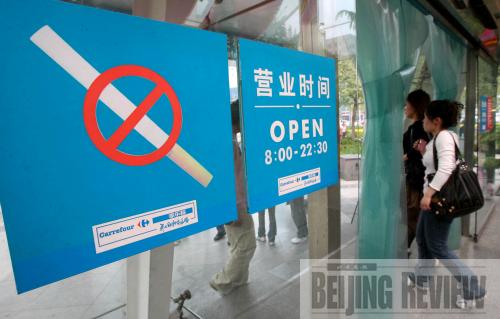|
 |
|
BANNED: People walk past a no-smoking sign at a shopping center in Zhongguancun, Beijing. On May 1, 2008, Provisions on the Scope of No-Smoking Public Places in Beijing came into effect (LI MINGFANG) |
The tax increase on tobacco products that went into effect last month has had no impact on Zhou Chengli, a 63-year-old Beijing resident. On the evening of June 27, walking out of a community store with a carton of cigarettes in hand, he told a reporter that he started smoking in his teens and hasn't stopped since. This hardened smoker finishes a pack a day, despite the warning on the package that smoking is harmful. In his pockets, there might be no money, but there are always cigarettes and lighters.
The Ministry of Finance and the State Administration of Taxation jointly released a circular in early June raising the tax on cigarettes. According to the circular, the consumption tax on cigarettes priced at 100 yuan ($14.64) per carton or above would increase from 45 percent to 56 percent; the consumption tax on cigarettes priced below 100 yuan would increase from 30 percent to 36 percent; and the tax on cigars would increase from 25 percent to 36 percent. The new policy also imposes a 5-percent tax on cigarette wholesalers nationwide.
But the policy seems to have had no serious impact on the retail price of cigarettes so far. Since prices haven't changed, Zhou can still buy cigarettes at the same price as before.
The China Association on Tobacco Control (CATC) has suggested the government increase the tobacco tax by a large margin so as to push up prices of tobacco products. The association believes that increasing cost is one of the most effective ways to reduce the smoking rate, especially among consumer groups sensitive to price, such as young people. Established in 1990, the CATC, an academic and non-profit organization, is composed of volunteers from various industries. The volunteers often go to public places to exhort people to give up smoking. Since the government raised the tobacco tax by only a small margin this time and did not push up cigarette prices, many people think this action is not meant to reduce the number of smokers, but purely to increase fiscal revenue.
Jia Kang, Director of the Research Institute for Fiscal Science in the Ministry of Finance, thinks the tax increase will ultimately affect consumers, otherwise it would be of no significance to public health.
But marginal increases in the tobacco tax are not the only reason for ineffective tobacco control in China.
Small achievements
According to figures from the Ministry of Public Health and the CATC, there are currently 350 million smokers in China, meaning one out of three Chinese is a smoker. Of the total number of smokers, 180 million are young people. Furthermore, 540 million Chinese are passive smokers who are involuntarily exposed to tobacco smoke. Every year 5.4 million people die from tobacco-related diseases worldwide, with 1 million of those in China, which is a larger number than the combined number of deaths from AIDS, tuberculosis, traffic accidents and suicide, and accounts for 12 percent of total deaths.
|

